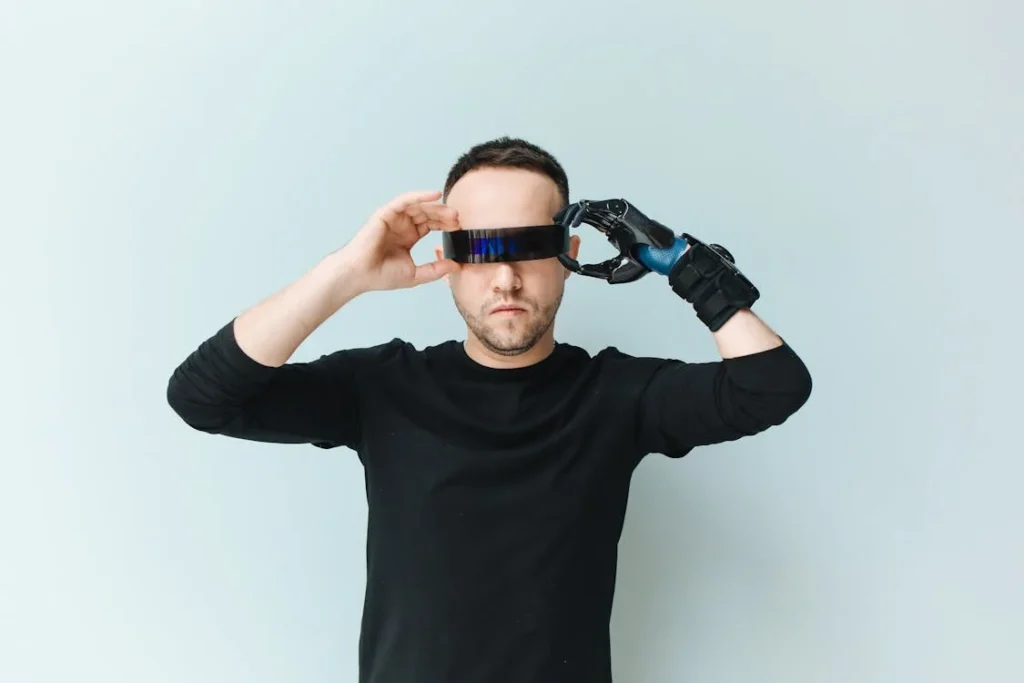The workplace is changing. With advances in technology and a growing focus on inclusivity, more people with limb loss are finding opportunities to build successful careers. However, accessibility in the workplace goes beyond ramps and ergonomic desks. It includes ensuring that individuals with prosthetic limbs—especially bionic ones—have the tools, support, and environment they need to thrive.
Bionic prosthetics are transforming what’s possible in the workforce. These advanced devices allow users to perform tasks with greater precision, flexibility, and confidence. Whether in office jobs, hands-on trades, or creative industries, bionic limbs help individuals overcome barriers that once made employment difficult.
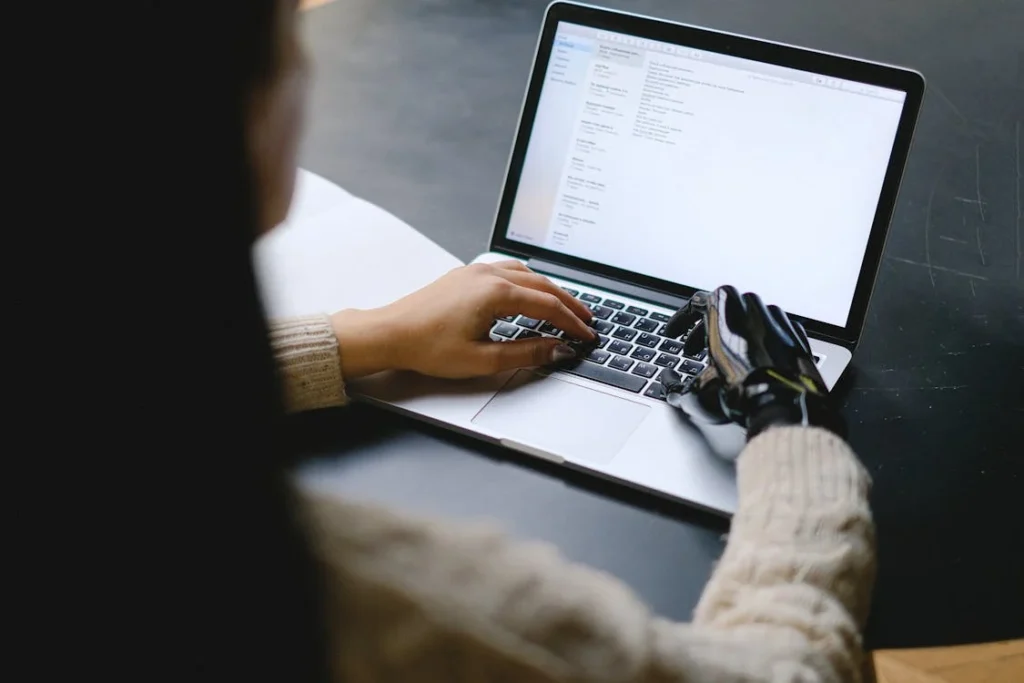
How Bionic Prosthetics Are Changing Workplace Accessibility
Workplace accessibility is about creating an environment where everyone, regardless of physical ability, can perform their job effectively. In the past, individuals with limb loss faced significant challenges in certain careers due to limitations in mobility and functionality.
However, bionic prosthetics are changing that by offering advanced movement, grip control, and even sensory feedback that allows for more natural interactions with tools, equipment, and technology.
Restoring Functionality and Precision in the Workplace
One of the biggest advantages of bionic prosthetics is their ability to restore fine motor skills and strength.
Many modern bionic hands, for example, allow users to grip objects with varying pressure, enabling them to hold delicate items like a pen or a glass of water while also being strong enough to lift heavier objects.
This level of control opens up opportunities in fields that require dexterity, such as engineering, healthcare, or manufacturing.
Bionic limbs equipped with myoelectric technology use muscle signals to control movement, making them more intuitive to use.
Unlike traditional prosthetics, which often require manual adjustments, bionic limbs respond to the user’s intent, allowing them to work faster and more efficiently.
This is especially beneficial in jobs that require repetitive hand or arm movements, as it reduces strain and improves overall productivity.
Expanding Career Options for Individuals with Limb Loss
Before the rise of bionic prosthetics, many career paths were difficult for individuals with limb differences.
Physical jobs in construction, automotive repair, or the medical field required a level of movement and precision that traditional prosthetics couldn’t provide. Today, bionic technology is helping bridge that gap.
In creative industries such as design, photography, and music, bionic hands with specialized attachments allow users to manipulate tools with greater ease.
Artists and musicians who once faced limitations can now paint, sculpt, or play instruments with the help of prosthetics that adapt to their specific needs. Similarly, in office settings, professionals can type, write, and use touchscreens with greater comfort and accuracy.
Enhancing Workplace Confidence and Independence
Beyond functionality, bionic prosthetics contribute significantly to a person’s confidence at work. Having a limb that moves naturally and performs essential tasks reduces the need for assistance, allowing employees to work independently.
This not only improves self-esteem but also changes the way employers and coworkers perceive individuals with prosthetics.
In many workplaces, employees with limb differences have historically been given modified tasks or reduced responsibilities.
With the advancements in bionic technology, these employees are now able to take on more roles without requiring major workplace adjustments. This shift in perception is helping to break down stereotypes and promote a more inclusive work culture.

Overcoming Workplace Challenges with Bionic Prosthetics
While bionic prosthetics have opened doors to new career opportunities, challenges still exist.
From adapting to the demands of different jobs to addressing workplace biases, individuals with prosthetic limbs often have to navigate obstacles that go beyond the physical capabilities of their prosthetic.
Understanding these challenges and finding solutions is key to ensuring a truly accessible and inclusive work environment.
Adapting to Different Work Environments
Not all workplaces are designed with prosthetic users in mind. Some job settings involve tools, machinery, or workstations that may need modifications to accommodate employees with bionic limbs.
For example, a factory job may require an employee to operate heavy-duty equipment, which could be difficult if a prosthetic lacks the right grip or strength.
In such cases, prosthetists and engineers work together to design customized attachments or modifications that help users interact more efficiently with their workspace.
In office environments, simple adjustments—such as ergonomic desks, voice-command software, or adaptive keyboards—can make tasks like typing or data entry more comfortable for individuals using a prosthetic.
Many modern workplaces are becoming more flexible in their approach to accessibility, investing in assistive technology that supports employees with prosthetic limbs.
Managing Fatigue and Long-Term Comfort
One of the lesser-discussed aspects of using a prosthetic in the workplace is fatigue. While bionic limbs restore function, they still require energy and effort to operate.
A full day of using a myoelectric prosthetic, for example, can cause muscle fatigue, particularly for new users who are still adjusting to their device.
To combat this, many professionals using bionic limbs develop strategies such as alternating tasks, taking breaks to reduce strain, or using prosthetic accessories that enhance comfort.
Some workplaces also offer adjustable work schedules to accommodate employees who may need extra recovery time, ensuring they remain productive without experiencing discomfort.
Breaking Down Workplace Bias and Stigma
Despite advancements in prosthetic technology, workplace biases still exist. Some employers may hesitate to hire individuals with prosthetic limbs due to misconceptions about their capabilities.
Others may unknowingly treat them differently, assuming they need special accommodations even when they are fully capable of handling the job independently.
Raising awareness and fostering open conversations about bionic prosthetics can help change these perceptions.
As more professionals with bionic limbs succeed in their fields, they pave the way for future generations by showing employers that prosthetic users can perform at the same level as their peers.
Companies that actively support inclusive hiring and educate their teams on prosthetic technology create environments where employees feel valued based on their skills rather than their physical differences.
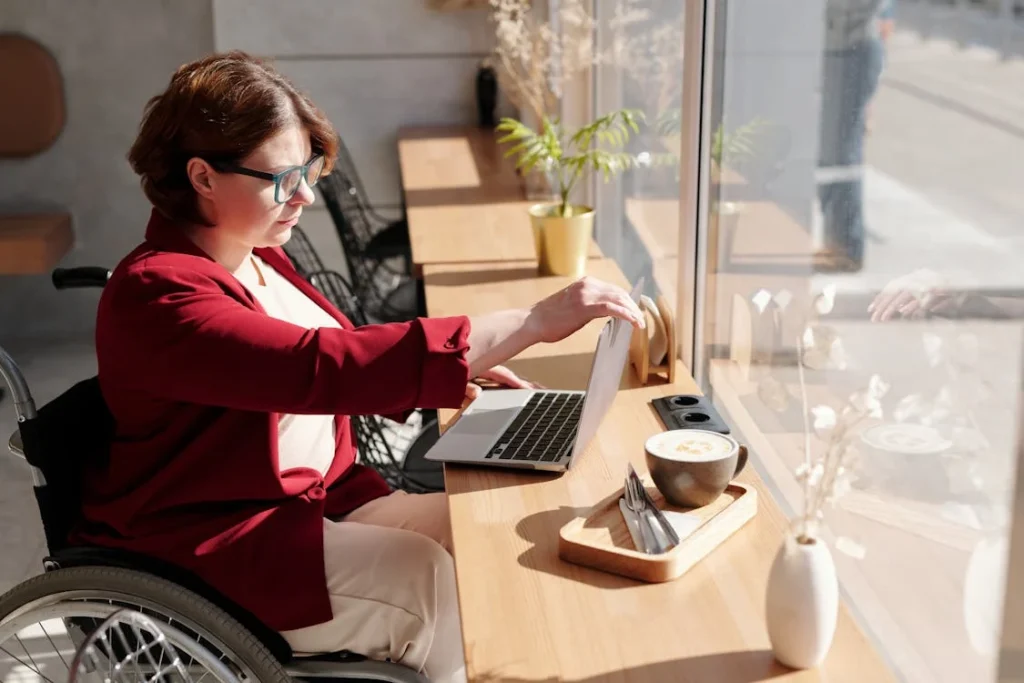
The Role of Employers in Supporting Prosthetic Users
Employers play a crucial role in ensuring that individuals with bionic prosthetics can thrive in the workplace.
While technology has made prosthetics more functional and adaptable, workplace policies, infrastructure, and attitudes must also evolve to create an inclusive environment.
Companies that embrace accessibility not only empower their employees but also benefit from a diverse and capable workforce.
Creating an Inclusive Work Environment
A truly inclusive workplace goes beyond meeting the minimum accessibility requirements.
Employers should focus on making their office culture welcoming to employees with prosthetic limbs by fostering open discussions, offering necessary accommodations, and providing equal opportunities for career growth.
When employees feel supported, they are more likely to perform confidently and contribute effectively to the organization.
Simple workplace modifications can make a big difference. Adjustable workstations, hands-free technology, and voice-activated software can help employees with bionic prosthetics perform tasks more efficiently.
For those in physically demanding roles, providing specialized tools or equipment can enhance productivity and reduce unnecessary strain.
Providing Training and Support
New employees who use bionic prosthetics may need time to adapt to their work environment, particularly if they are entering a new industry.
Offering training programs tailored to prosthetic users can help bridge the gap between technology and practical application.
This may include on-the-job training with customized tools, mentorship programs with other prosthetic users, or guidance from occupational therapists on optimizing prosthetic use in a specific setting.
Workplace ergonomics also play a crucial role in long-term comfort. Employers can partner with prosthetists or accessibility experts to evaluate how workspaces can be adjusted to better suit employees with prosthetic limbs.
Something as simple as adjusting the height of a work surface or modifying the layout of a workstation can make daily tasks more efficient and reduce physical strain.
Encouraging an Inclusive Work Culture
While technology and accessibility modifications are essential, workplace culture is equally important. Employees with prosthetic limbs should feel like valued members of the team, rather than being seen as different or needing constant special treatment.
Employers can promote inclusivity by offering disability awareness training, encouraging open dialogue, and ensuring that hiring practices focus on skill and ability rather than physical differences.
Employers who actively work to reduce unconscious biases help create an environment where prosthetic users feel empowered rather than self-conscious.
By normalizing the presence of employees with prosthetic limbs and highlighting their contributions, companies help shift the narrative from “accommodation” to “capability.”
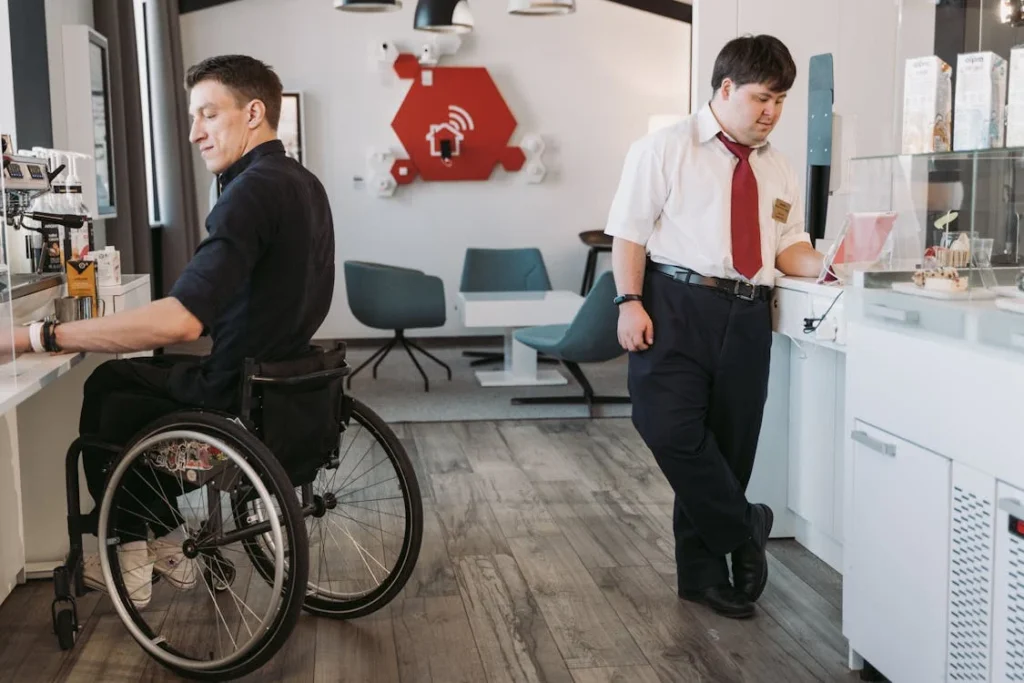
Career Growth and Opportunities for Professionals with Bionic Prosthetics
Bionic prosthetics not only enhance workplace accessibility but also open doors to career advancement. Employees with prosthetic limbs are increasingly finding opportunities to rise in their fields, take on leadership roles, and pursue careers that were once thought to be out of reach.
With the right support, training, and technology, individuals with bionic limbs can compete on equal footing with their peers and carve out successful professional paths.
Breaking Barriers in Different Industries
Bionic prosthetics have revolutionized the way individuals with limb differences engage in various professions.
In STEM fields, for instance, engineers, scientists, and medical professionals can now manipulate tools with greater precision, thanks to myoelectric and multi-grip prosthetic hands.
These advancements make it easier to conduct delicate procedures, work with specialized instruments, and handle complex technical tasks.
In sports and fitness, athletes with bionic limbs are pushing the limits of what is possible, competing at professional levels and inspiring others to embrace adaptive sports.
Customized prosthetic designs for high-impact activities have made careers in coaching, training, and athletics more accessible to those with limb loss.
The creative industry is another space where bionic prosthetics are making an impact. Musicians, artists, and photographers can now use advanced prosthetic hands with fine-motor control, allowing them to paint, play instruments, or operate cameras with greater ease.
The ability to customize prosthetic limbs for specific creative tasks has given individuals the freedom to pursue careers that require intricate hand movements.
Leadership and Entrepreneurship
With advancements in bionic technology reducing limitations, more professionals with prosthetic limbs are stepping into leadership and entrepreneurial roles.
Business owners, executives, and managers who use bionic prosthetics are challenging outdated perceptions and proving that physical differences do not define professional ability.
By leading teams, making key business decisions, and managing projects, these individuals serve as role models, demonstrating that skill and determination matter far more than physical limitations.
Additionally, many prosthetic users are now influencing the accessibility and prosthetics industry itself. Some go on to become advocates, product designers, or entrepreneurs focused on improving assistive technology.
Their lived experiences give them valuable insights into what users truly need, leading to innovations that make prosthetics even more functional and user-friendly.
The Importance of Continuous Learning and Adaptation
As technology continues to evolve, professionals using bionic prosthetics must stay up to date with new advancements.
Learning how to optimize prosthetic functionality, integrating emerging tools, and staying adaptable in a changing work environment are crucial for long-term career success.
Many organizations now offer professional development programs that include assistive technology training, ensuring that employees with prosthetic limbs can continue growing in their careers.
Companies that invest in the career development of employees with prosthetics not only benefit from a diverse workforce but also foster an environment where talent is recognized regardless of physical differences.
Encouraging continued education, providing mentorship opportunities, and supporting employees in their career aspirations create workplaces where everyone has the chance to succeed.
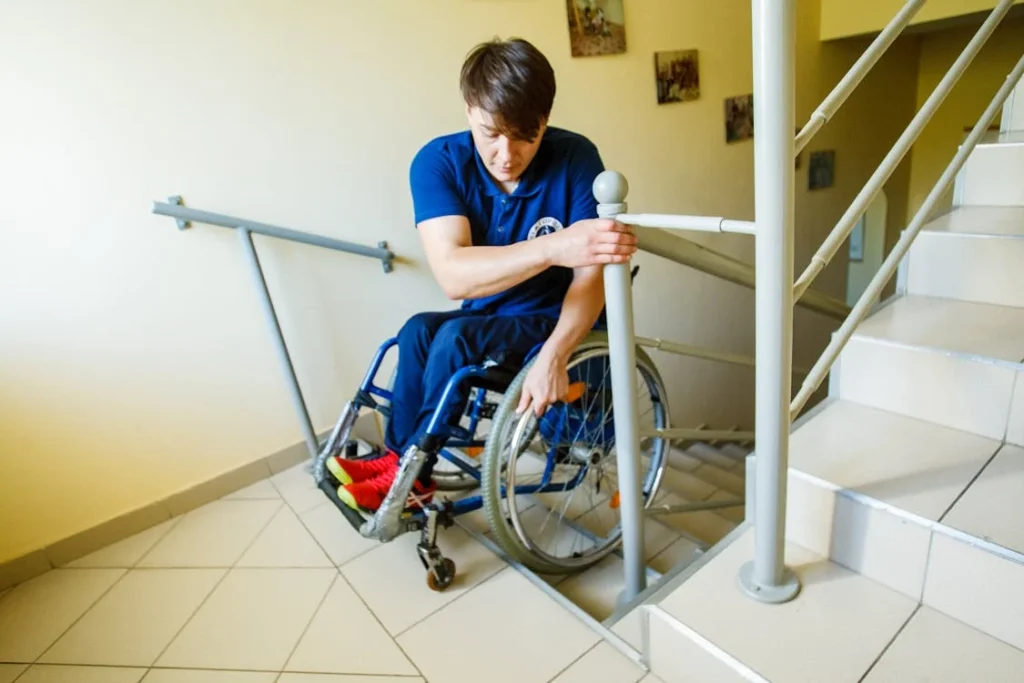
The Future of Workplace Accessibility with Bionic Prosthetics
As technology advances and workplace cultures become more inclusive, the future looks promising for professionals with bionic prosthetics.
The combination of cutting-edge prosthetic technology, accessibility initiatives, and progressive hiring practices is creating a professional landscape where individuals with limb differences can thrive.
Advancements in Prosthetic Technology for the Workplace
The next generation of bionic prosthetics is expected to be even more intuitive, adaptable, and user-friendly.
Innovations in AI-driven movement control are allowing prosthetic limbs to learn and adapt to users’ unique motion patterns, making them more responsive and reducing the effort required for everyday tasks.
This development will be particularly beneficial in workplaces that require repetitive hand movements, such as manufacturing, data entry, and healthcare.
Another breakthrough in the field is sensory feedback technology, which allows prosthetic users to “feel” textures, pressure, and temperature.
This could significantly improve performance in jobs requiring fine motor skills, such as surgery, laboratory research, or mechanical repairs. With a more natural sense of touch, professionals can carry out their work with greater precision and confidence.
The integration of bionic limbs with workplace tools and software is also becoming a reality. Some prosthetic limbs are now compatible with smart devices, allowing users to control computers, machinery, and other digital systems seamlessly.
This technology is particularly useful in office environments, where professionals can use voice-activated commands, touch-sensitive prosthetics, or even brain-controlled interfaces to interact with workplace systems.
Policy Changes and Legal Protections for Employees with Prosthetic Limbs
While technological advancements are making workplaces more accessible, policy changes and legal protections are just as important.
Governments and organizations around the world are introducing new laws and workplace guidelines to ensure that individuals with prosthetic limbs receive fair opportunities in employment.
Stronger anti-discrimination policies are helping to eliminate biases during hiring processes, ensuring that candidates are evaluated based on their skills and experience rather than their physical differences.
Additionally, workplace accessibility laws are requiring companies to provide reasonable accommodations, such as adaptive tools, modified workstations, and flexible work schedules.
Many organizations are also investing in disability inclusion programs, which focus on hiring and training employees with limb differences.
These programs not only provide better job opportunities but also educate teams on how to create an environment where all employees feel respected and valued.
Changing Perceptions and Embracing Inclusivity
Perhaps one of the most significant shifts in workplace accessibility is the changing perception of employees with bionic prosthetics. In the past, individuals with limb differences were often seen as needing special accommodations.
Today, they are increasingly viewed as professionals with unique strengths and capabilities.
Companies are beginning to recognize that employees with prosthetics bring diverse perspectives, problem-solving skills, and resilience to the workplace.
Many individuals who use prosthetic limbs have developed exceptional adaptability, a skill that is highly valuable in any industry.
As workplaces continue to embrace inclusivity, employees with prosthetics are no longer seen as exceptions—they are becoming integral contributors to teams and industries worldwide.
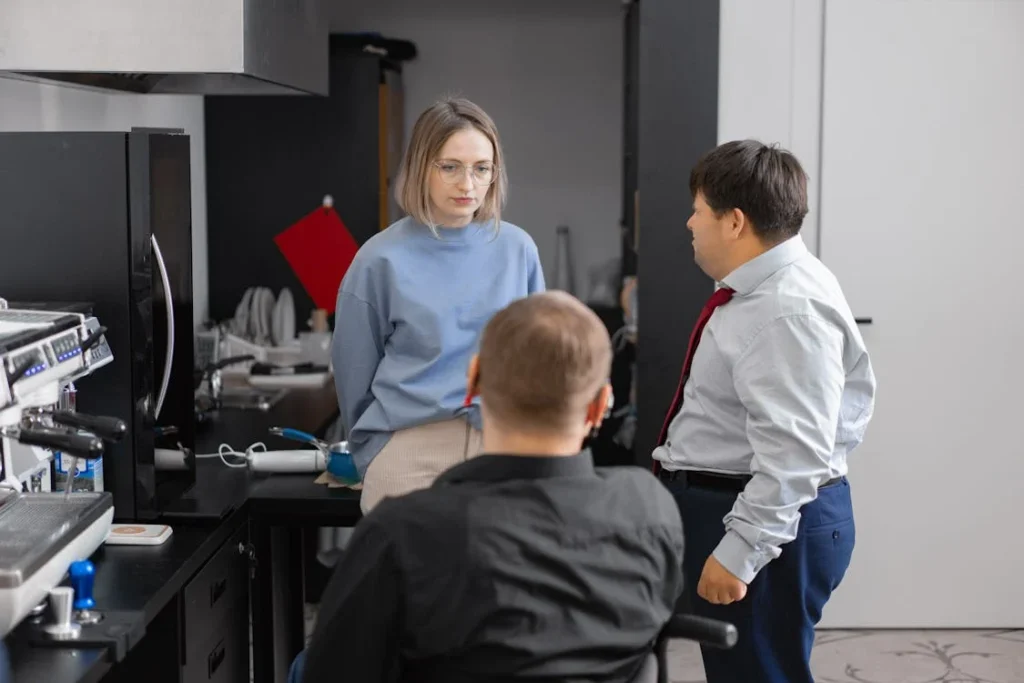
Empowering the Next Generation of Professionals with Bionic Prosthetics
The future of workplace accessibility does not just depend on technology and policies—it also relies on inspiring and equipping the next generation of professionals with limb differences.
As more individuals with bionic prosthetics enter the workforce, they are setting new standards, proving that skill and determination are far more important than physical limitations.
Encouraging Young Professionals to Pursue Their Careers
For many individuals with limb differences, choosing a career path can feel intimidating, especially if they have never seen someone like them succeed in their desired field.
Role models play a crucial role in changing this mindset. When young professionals see others with prosthetic limbs thriving in medicine, engineering, business, or the arts, it reinforces the belief that they, too, can achieve their goals.
Mentorship programs are becoming an essential tool in guiding the next generation. Experienced professionals with prosthetic limbs are now mentoring students, recent graduates, and career changers, offering them advice on navigating the workplace.
These programs help build confidence, provide networking opportunities, and give young professionals the tools they need to advocate for themselves.
Universities and technical training institutes are also stepping up by integrating assistive technology and prosthetic training into their curriculum.
Some programs now offer specialized career counseling, ensuring that students with limb differences receive guidance on how to transition into professional environments.
These efforts are helping to remove barriers and ensure that no career path is off-limits due to a prosthetic limb.
How Businesses Can Support Future Talent
Organizations looking to foster workplace diversity must actively create spaces where professionals with prosthetics feel welcomed and empowered.
This means not only hiring individuals with prosthetic limbs but also ensuring they have the same opportunities for career advancement, leadership roles, and specialized training as their peers.
Companies that embrace diversity initiatives, such as inclusive hiring programs, disability resource groups, and prosthetic-friendly workspaces, position themselves as leaders in accessibility.
When businesses take these steps, they don’t just help employees with prosthetic limbs—they create a culture of innovation and inclusivity that benefits all workers.
Technology companies developing bionic prosthetics are also playing a vital role in workplace integration. By collaborating with industries to design prosthetic limbs tailored for specific professions, they ensure that users can perform their jobs more efficiently.
Robobionics, for example, continues to push the boundaries of prosthetic innovation, providing solutions that enable professionals to work with greater ease and confidence.
A Workplace Without Barriers
The vision for the future is clear: a world where individuals with bionic prosthetics are no longer seen as exceptions, but as equals in the workforce.
With continued advancements in technology, evolving workplace policies, and a cultural shift toward inclusivity, the barriers that once limited career opportunities for individuals with prosthetic limbs are rapidly disappearing.
Whether in offices, factories, research labs, or creative spaces, employees with prosthetic limbs are proving that they can excel in any profession.
Companies that recognize and support this potential will be the ones leading the way in the future of accessibility, innovation, and professional growth.
Conclusion
Bionic prosthetics are transforming workplace accessibility, allowing individuals with limb differences to pursue careers without limitations. These advanced prosthetic limbs provide greater functionality, precision, and confidence, making it possible to excel in a wide range of industries—from engineering and healthcare to creative arts and entrepreneurship.
However, true accessibility goes beyond technology. Employers, educators, and policymakers must continue fostering inclusive work environments by offering adaptive tools, mentorship programs, and equal career growth opportunities. As businesses embrace diversity and accessibility, employees with prosthetic limbs will no longer be seen as exceptions but as valuable contributors to their fields.
The future of work is one where skill, talent, and determination matter more than physical differences. At Robobionics, we are dedicated to developing prosthetic solutions that help individuals achieve their professional goals. If you’re looking for a prosthetic that supports your career ambitions, contact us today and take the next step toward a limitless future!



